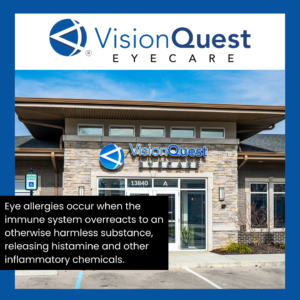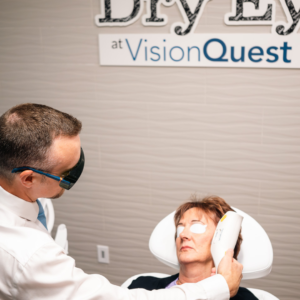Springtime in the Midwest is a beautiful season—trees bloom, grass turns green, and flowers brighten the landscape. But for many, it also brings an unwelcome side effect: itchy, red, watery eyes caused by seasonal allergies. Whether it’s pollen, dust, or pet dander, allergens can trigger frustrating eye symptoms that make it difficult to enjoy outdoor activities.
Eye allergies are often mistaken for dry eye syndrome, another common condition that causes discomfort and irritation. While both can lead to redness and watery eyes, the underlying causes and treatments differ. At VisionQuest Eyecare, we help patients identify the root of their symptoms and provide targeted solutions for long-term relief.
What Causes Eye Allergies?
Eye allergies occur when the immune system overreacts to an otherwise harmless substance, releasing histamine and other inflammatory chemicals. This reaction leads to redness, swelling, itching, and excessive tearing. Common triggers include pollen, dust mites, pet dander, mold, and smoke. In some cases, eye irritation may stem from fragrances, cosmetics, or preservatives found in certain eye drops.
While allergies typically flare up seasonally, indoor allergens can cause year-round eye discomfort. Those with a family history of allergies may be more prone to experiencing symptoms.
Eye Allergies vs. Dry Eye: How to Tell the Difference
Since eye allergies and dry eye share similar symptoms, distinguishing between them is crucial for effective treatment. Allergies usually cause intense itching, watery discharge, and swelling, often accompanied by sneezing or nasal congestion. Dry eye, on the other hand, tends to create a gritty, burning sensation and fluctuating blurry vision that worsens after prolonged screen use or exposure to dry air.
If symptoms persist despite using allergy medications or artificial tears, it may be a sign of underlying dry eye syndrome rather than seasonal allergies. An eye exam at VisionQuest Eyecare can help determine the cause and best course of action.
Treatment Options for Eye Allergies
The most effective way to manage eye allergies is to reduce exposure to triggers whenever possible. Keeping windows closed during high-pollen seasons, using air purifiers indoors, and washing hands after handling pets can help minimize irritation.
For those experiencing persistent symptoms, over-the-counter and prescription treatments can provide relief. Artificial tears help flush allergens from the eyes, while antihistamine eye drops reduce itching and redness. Some patients may benefit from mast cell stabilizers, which prevent allergic reactions from occurring in the first place. In severe cases, short-term steroid eye drops may be prescribed to control inflammation.
If standard treatments are ineffective, allergy immunotherapy (allergy shots) may help build long-term resistance to allergens, reducing symptoms over time.
When Dry Eye Is the Real Problem
Many patients assume their red, irritated, or watery eyes are due to allergies, only to find that dry eye syndrome is the actual culprit. Unlike allergies, dry eye occurs when the eyes do not produce enough high-quality tears to stay properly lubricated. This can be caused by aging, hormonal changes, prolonged screen use, or environmental factors like air conditioning and heating.
At VisionQuest Eyecare, we offer advanced dry eye treatments, including prescription eye drops that increase tear production, punctal plugs to retain moisture, and lipid-based artificial tears for long-lasting hydration. By addressing the root cause of symptoms, we help patients find lasting relief from chronic eye discomfort.
Find Relief from Eye Allergies and Dry Eye at VisionQuest Eyecare
If seasonal allergies or dry eye are affecting your daily life, VisionQuest Eyecare can help. Our experienced eye doctors use advanced diagnostics to pinpoint the cause of your symptoms and provide customized treatment options.
Don’t let itchy, irritated eyes keep you from enjoying your favorite activities. Schedule an appointment today to find relief.

Dr. Collin Rush is passionate about bringing clear eyesight and better eye health to the community. Having graduated in the top 1% of his class at Indiana University School of Optometry, Dr. Rush primarily focuses on dry eye and keratoconus but is also trained in laser therapies for glaucoma and secondary cataracts.



